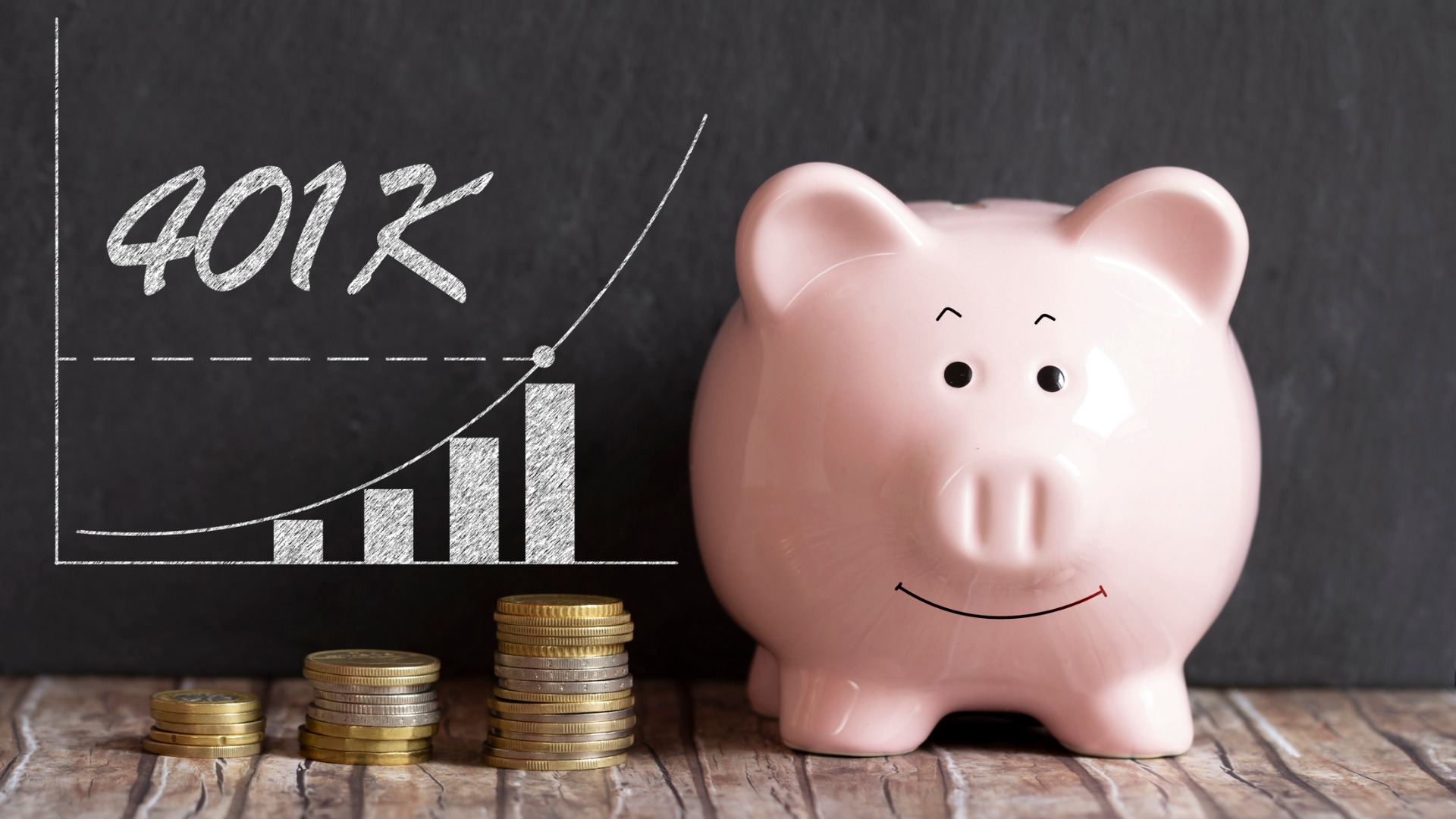Table of Contents
You’ve heard about 401(k) plans, but do you really know how they work? It’s not as complicated as you might think. In fact, understanding your 401(k) can be the key to unlocking a comfortable retirement.
This article will guide you through what a 401(k) is, how it earns money, and whether or not it’s worth investing in. Let’s dive right in and decipher this retirement puzzle together!
What Is a 401(k) Plan
A 401(k) plan is essentially a retirement savings account that is offered by your employer. It has some pretty big tax advantages. When you contribute to your 401(k), you are using pre-tax dollars. This means the money is taken out of your paycheck before taxes are deducted, which can significantly lower your taxable income for the year.
The funds in this account then grow tax-deferred until withdrawal at retirement age. However, it’s important to remember that this isn’t free money! When you start taking distributions during retirement, those withdrawals will be taxed as regular income.
Nevertheless, a 401(k) is an excellent tool to work towards financial stability in your golden years if it’s available to you through your job.
How 401(k) Plans Work
Understanding the mechanics of 401(k) plans is essential for long-term financial planning. These retirement savings accounts offer significant benefits. As an employee, you can contribute a portion of your pre-tax salary into the account. Your employer may also match a percentage of your contribution, providing free money for your retirement.
There are two types of 401(k) plans to choose from: traditional and Roth. Traditional 401(k) plans offer tax deductions now, while Roth 401(k) plans allow for tax-free withdrawals later in life. It’s important to consider your preferences and financial goals when deciding which option is best for you.
There are also yearly contribution limits that you should be aware of. Exceeding these limits may result in penalties or tax implications. Additionally, it’s important to note that withdrawing funds from your 401(k) before age 59½ typically incurs penalties unless under specific circumstances.
To make the most of your 401(k) plan, it’s crucial to understand all these aspects and consider them in your financial planning.
How does a 401(k) Earn Money
You’re probably wondering how a 401(k) grows over time. It’s not magic, but it might feel like it sometimes!
Your contributions are invested in a mix of stocks, bonds, mutual funds or other assets depending on your preference and the options provided by your plan. These investments have the potential to earn money through dividends or increased value. The beauty is that you don’t need to do anything; it’s all managed for you.
But remember, markets can fluctuate so there’s no guarantee of profit and you could even lose money. However, generally speaking, if you’re in it for the long haul, chances are your 401(k) will grow significantly and provide a nice nest egg for your retirement.
Taking Withdrawals From a 401(k)
Taking money out of your 401(k) before retirement isn’t as simple as withdrawing from a bank account. It’s important to know the rules so you don’t get hit with penalties.
If you’re under 59½ years old, early withdrawals generally incur a 10% penalty plus income taxes. However, there are exceptions like disability or certain medical expenses.
After age 59½, you can start making withdrawals without penalties but still owe taxes. At age 72, you must begin taking required minimum distributions (RMDs), otherwise, hefty fines await.
It’s crucial to plan your withdrawals carefully as they could bump you into a higher tax bracket or even jeopardize your retirement security if not managed wisely.
Required Minimum Distributions (RMDs)
When you reach the age of 72, it’s imperative that you start making Required Minimum Distributions (RMDs) from your retirement accounts to avoid hefty penalties. The IRS uses specific life expectancy tables to calculate your RMDs, based on your account balance and age. You’ve got until April 1 of the year following the one in which you turned 72 to take out that first distribution.
If you neglect this rule or miscalculate your RMDs, you’ll face a penalty — half the amount that should have been withdrawn but wasn’t. That’s no small piece of change! So it’s crucial to stay on top of this aspect of managing your 401(k).
Traditional 401(k) vs. Roth 401(k)
It’s crucial to understand the differences between a traditional 401(k) and a Roth 401(k), as they each offer unique tax advantages that can significantly impact your retirement savings.
With a traditional 401(k), you’ll make contributions from your pre-tax income, reducing your taxable income now, but you’ll be taxed when you withdraw in retirement.
In contrast, with a Roth 401(k), you’re paying taxes upfront on the money you contribute, so withdrawals in retirement are tax-free.
Consider your current tax bracket and what it might be when you retire. If you expect to be in a higher tax bracket upon retirement, a Roth could be more beneficial. That’s because you’d pay taxes now at a lower rate than what you’d pay later.
How Do You Start a 401(k)
Now that you’ve grasped the difference between Traditional and Roth 401(k) plans, let’s dive into how you can start your own 401(k).
It’s not as daunting as it may seem. Your first step is to check with your employer. If they offer a 401(k) plan, they’ll provide you with the necessary forms to get started.
You’ll then need to decide how much of your paycheck you want to contribute. Don’t forget, this money is taken out before taxes!
Next, select from the investment options offered by your plan – don’t worry if you’re not an expert, financial advisors are often available for guidance.
And voila! You’re on your way towards building a sturdy nest egg for retirement. Remember, starting early gives compound interest more time to work its magic!
What Is the Maximum Contribution to a 401(k)
You’re probably wondering about the maximum amount you can contribute to your 401(k) each year. Well, there’s good news: the government sets limits, and they tend to rise over time.
For 2021, if you’re under 50, you can chip in up to $19,500 annually. If you’re aged 50 or over, it goes up to $26,000 due to a catch-up contribution of $6,500.
The thing is, these aren’t just random figures; they’ve been designed this way for a reason. It’s all part of encouraging long-term saving for retirement while offering tax advantages.
Just keep in mind that exceeding these limits could result in penalties. So do your math right and plan wisely!
Is It a Good Idea to Take Early Withdrawals From Your 401(k)
While there’s an option for early withdrawals from your 401(k), it’s important to consider the potential tax implications and penalties. You’ll be hit with a hefty 10% penalty if you’re under 59.5 years old, plus you’ll have to pay income tax on the amount withdrawn. It could potentially push you into a higher tax bracket, too.
You should also bear in mind that by taking out money now, you’re robbing your future self of retirement funds. That money won’t be there earning interest for your golden years. It’s generally best to think of your 401(k) as untouchable until retirement unless it’s an absolute emergency.
Weigh up all options thoroughly before deciding to dip into these savings early!
What Is the Main Benefit of a 401(k)
One of the main benefits of a 401(k) is that it allows you to save for retirement on a tax-deferred basis. This means you won’t have to pay taxes on your contributions until you start making withdrawals.
This isn’t just pocket change we’re talking about. It’s potentially thousands of dollars that can stay in your account, compounding and growing over time. You know how important it is to make your money work for you, right?
Well, with this setup, Uncle Sam’s helping out too.
But remember, when you do decide to withdraw those funds during retirement, they’ll be taxed as regular income. So plan accordingly and consider seeking advice from a financial advisor if needed.
At the end of the day, it’s all about securing your future comfort and well-being.
401k Contribution Limits (2023)
For 2023, the 401(k) contribution limit for employees is $22,500, or $30,000 if you are age 50 or older. This amount is up from 2022, when the individual 401(k) contribution limit was $20,500, or $27,000 for employees who were 50 or older.
But remember, these are just individual contribution limits – your employer’s match doesn’t count towards this cap. So really, the total amount that can go into your account is even greater! It’s an attractive way to save for retirement and reduce taxable income now.
Don’t miss out; take full advantage of these generous allowances while they last.
401k Plan Types
You’re probably wondering about the different types of 401(k) plans available to you. Well, there are mainly two kinds: Traditional and Roth.
In a Traditional plan, your contributions are pre-tax which means you don’t pay taxes on that income until you withdraw it in retirement. On the other hand, Roth’s contributions are post-tax; you’ll pay taxes now but won’t owe any when withdrawing.
There’s also the Safe Harbor 401(k), where employers must make mandatory contributions regardless of company profits. This type is beneficial for highly compensated employees who might otherwise be limited by non-discrimination tests.
Lastly, there’s SIMPLE 401(k) designed for small businesses with fewer than 100 employees. Here, employer contributions are mandatory as well but lesser compared to Safe Harbor.
Employer Contribution Match
In considering your 401(k) options, don’t forget to look into your employer’s contribution match; this is when they’ll match a certain amount of what you put in yourself. It’s essentially free money that helps grow your retirement savings faster.
Normally, an employer might contribute 50% of the first 6% you invest. That means if you’re putting in 6% of your salary, they’re effectively adding another 3%.
This doesn’t mean you should only contribute up to that match percentage though. You can always save more and it’ll build over time due to compound interest. But ensuring you’re at least hitting that employer-matching threshold is a smart move financially – it maximizes the benefit you’re getting from your job beyond just the paycheck itself.
Self-Employed 401k
So, you’ve understood how employer contributions work with a 401k plan. That’s great! Now, let’s dive into something different — Self-Employed 401k.
As a self-employed person, you’re the boss. You don’t have an employer to match your contributions. But don’t worry; there’s still a lot of benefits for you. With a Self-Employed 401k, also known as Solo 401k or Individual 401k, you can contribute both as an employee and employer to your account. Yes, that’s right; you wear two hats in this scenario!
This double role allows for higher contribution limits compared to traditional plans. Plus, it offers tax advantages just like any other 401k plan! So even if you’re self-employed, planning for retirement is still within your reach.
What Happens To 401k When You Quit
Switching jobs or quitting can leave you wondering what’ll happen to your 401k. Don’t fret, you’ve got options.
You can roll it over into an IRA or a new employer’s plan if they offer one. Both are tax-free moves if done correctly. If you decide to cash out, be aware there’ll be taxes and possibly penalties involved.
Another option is leaving it where it is with your former employer’s plan, as long as the balance exceeds $5,000. They can’t force you out unless your balance drops below this threshold.
Whatever you choose, make sure to consider the impact on your long-term retirement goals before making a decision that may seem beneficial in the short term but could cost you in the long run.
Is The 401k A Good Investment
So, now you’re familiar with what happens to your 401k if you decide to pack up and leave your job.
But let’s shift gears and delve into a new question: Is investing in a 401k a good idea?
Well, it’s not as simple as yes or no. It largely depends on your financial situation, retirement goals, and risk tolerance.
Sure, there are perks like tax advantages and potential employer match contributions that make it quite attractive.
However, remember there are also limitations such as possible penalties for early withdrawal and limited investment options.
You’ve got to weigh the pros against the cons and consider all other factors before deciding whether a 401k is the best path for you towards financial security after retirement.
What Are The Pros And Cons Of A 401(k)
You’re probably wondering about the specific advantages and disadvantages of a 401k, aren’t you? Well, let’s dive right in.
One major advantage is that contributions are pre-tax, meaning they reduce your taxable income. Plus, many employers will match your contribution up to a certain percentage – free money!
But it’s not all sunshine and rainbows. You can’t access this money before turning 59.5 without paying penalties (except in some circumstances). There’s also the risk of losing investment value if the market declines.
Is A 401k Worth It Anymore
Given the pros and cons we’ve just discussed, you might be questioning whether it’s still worthwhile to invest in a 401k. It’s a fair question, but consider this: despite its drawbacks, a 401k remains one of the most effective vehicles for retirement savings.
The tax benefits alone can significantly boost your long-term returns.
Yes, there are restrictions and potential penalties if you withdraw early. However, remember that the aim is to build savings for your future self; it’s not meant to be an emergency fund.
With disciplined saving, employer match contributions, and careful investment selection within your plan, you can build substantial wealth over time.
In short? Yes, it’s still worth it – assuming you’re using it correctly. Don’t let the potential downsides deter you from harnessing its power for your retirement planning.
How Much Should I Contribute To My 401(k)
Determining how much you should contribute to your 401k isn’t always straightforward. It depends on various factors like your current income, lifestyle needs, and retirement goals. You’ve got to consider what’s feasible for you now without compromising your future comfort.
It’s recommended that you put away at least 10-15% of your pre-tax income if possible. But don’t stress if that’s not doable right away. Even small contributions can grow over time due to compound interest.
Remember, the aim here isn’t just saving but ensuring you’re setting yourself up for a comfortable retirement. So take stock of what you can realistically afford, keep an eye on those future goals, and adjust your contributions accordingly.
It’s all about finding balance in today’s wants and tomorrow’s needs.
Do You Pay Taxes On A 401k Withdrawal?
It’s important to note that withdrawals from your 401k are subject to taxes. The rate depends on your income bracket at the time of withdrawal. That means if you’re in a higher tax bracket when you retire, you’ll be hit with a larger tax bill than if your income is lower. Yes, it can be a bit of a bummer.
Also, remember there’s an extra 10% penalty if you withdraw before age 59½ unless certain exceptions apply. You’ve got to think about this decision carefully because it could impact your retirement nest egg significantly. So, try to avoid early withdrawals whenever possible and make sure you understand the tax implications before making any moves with your 401k funds.
It’s all about planning wisely for your golden years!
Frequently Asked Questions
Can I Transfer My 401(K) to a New Employer?
Yes, you can transfer your 401(k) to a new employer. It’s called a rollover and it lets you move your retirement savings without tax penalties. But, always check if your new employer accepts transfers first.
What Happens to My 401(K) if My Employer Goes Bankrupt?
If your employer goes bankrupt, don’t panic. Your 401(k) is safe. It’s your money, held in a trust separate from your employer’s assets. Even if they fail financially, you won’t lose your retirement savings.
Can I Use Funds From My 401(K) to Pay off Debt?
Yes, you can use your 401(k) funds to pay off debt. However, it’s generally not recommended as you’d incur penalties and taxes for early withdrawal. It’s better to consider other debt repayment options first.
Are There Penalties for Not Using My 401(K) Funds by a Certain Age?
Yes, there are penalties if you don’t start withdrawing your 401(k) funds by age 72. This is known as Required Minimum Distribution (RMD). You’ll face a hefty tax penalty on the amount not withdrawn.
What Are the Implications of Borrowing Against My 401(K)?
When you borrow against your 401(k), you’re essentially taking a loan from yourself. However, if you can’t pay it back on time, it’s considered an early withdrawal and could incur taxes and penalties.
Conclusion
In conclusion, a 401(k) is a powerful tool for retirement savings. It’s your means of securing a comfortable future, but it comes with its own rules and obligations.
You’ve got to make wise decisions about contributions, taxes, and withdrawals. Despite the downsides, it’s still worth investing in. Remember to consider your financial situation and retirement goals before deciding how much you should contribute.








